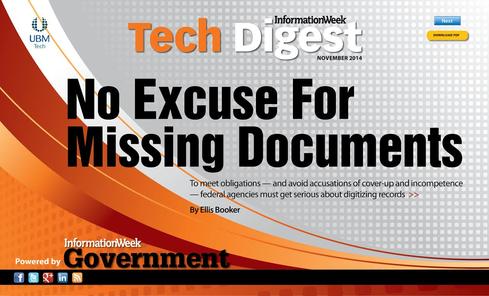In Government, No Excuse For Missing DocumentsIn Government, No Excuse For Missing Documents
To meet regulatory obligations -- and avoid accusations of cover-up and incompetence -- federal agencies must get serious about digitizing records.

 Download the entire November Tech Digest of information Government, distributed in an all-digital format (registration required).
Download the entire November Tech Digest of information Government, distributed in an all-digital format (registration required).
Are your agency's documents digitized, securely stored, and easily retrievable by those with the right clearance? If not, you're about to run afoul of regulations -- and you're missing an opportunity to leverage some high-profile events to get buy-in for better, more secure data management.
First, there's the ongoing saga of Edward Snowden, the former intelligence contractor for the National Security Agency who leaked thousands of classified digital documents to media outlets last year. Then in June came disclosures during congressional hearings that the Internal Revenue Service could not locate an untold number of emails. The IRS said Lois Lerner, the former head of the IRS division that processes applications for tax-exempt status, and other employees had archived data to their local hard drives when their email accounts became too full; the agency limited employees to 500 MB of storage on its Microsoft Exchange servers. The archives were lost when the computers' hard drives crashed, the IRS said.
In both cases, don't blame digitization -- blame poor data management practices.
"Throughout this review, the IRS has found no evidence that any IRS personnel deliberately destroyed any evidence," said the agency in a statement. "To the contrary, the computer issues identified appear to be the same sorts of issues routinely experienced by employees within the IRS, in other government agencies and in the private sector."
In the Snowden case, security experts point out there was no legitimate reason for someone in his role to be allowed to download caches of sensitive documents.
Of course, government agencies are different from private sector IT organizations in one crucial way: They might not have autonomy to set policies as they operate under a web of city, state, and federal rules. Indeed, that's part of the problem, according to one person familiar with government IT deployments.
"The state can't mandate [solutions] to cities, and the feds can't mandate to the states," says an executive at one software vendor who deals with government. Funded mandates have a better chance of being implemented at lower levels than unfunded ones, but even this isn't a sure thing. These problems arise from a tradition of bureaucratic autonomy in the United States and aren't as big a problem in, for instance, Europe, he says.
This view isn't necessarily shared by other IT vendors -- at least, not publicly. Storage and document management vendors with government practices we spoke with say they see strong prospects to sell products for long-term, secure data preservation.
The Obama administration is signaling a long-term commitment to digital data by appointing former Google exec Megan Smith as chief technology officer of the United States and putting former Google engineer Mikey Dickerson at the helm of the new US Digital Service. The USDS is charged with, as then-federal CIO Steve VanRoekel put it, "removing barriers to exceptional government service delivery and remaking the digital experiences that citizens and businesses have with their government."
The writing is on the White House wall that the future is digital. However, for now, federal IT pros face a technology and policy patchwork that will test IT pros trying to lead the transition.
To read the rest of this story,
download the entire November Tech Digest of information Government.
About the Author
You May Also Like






